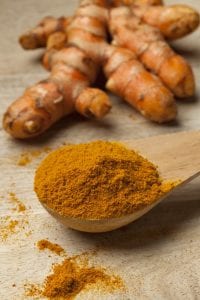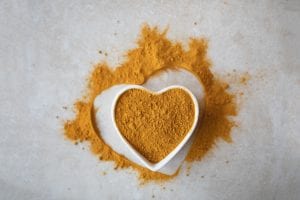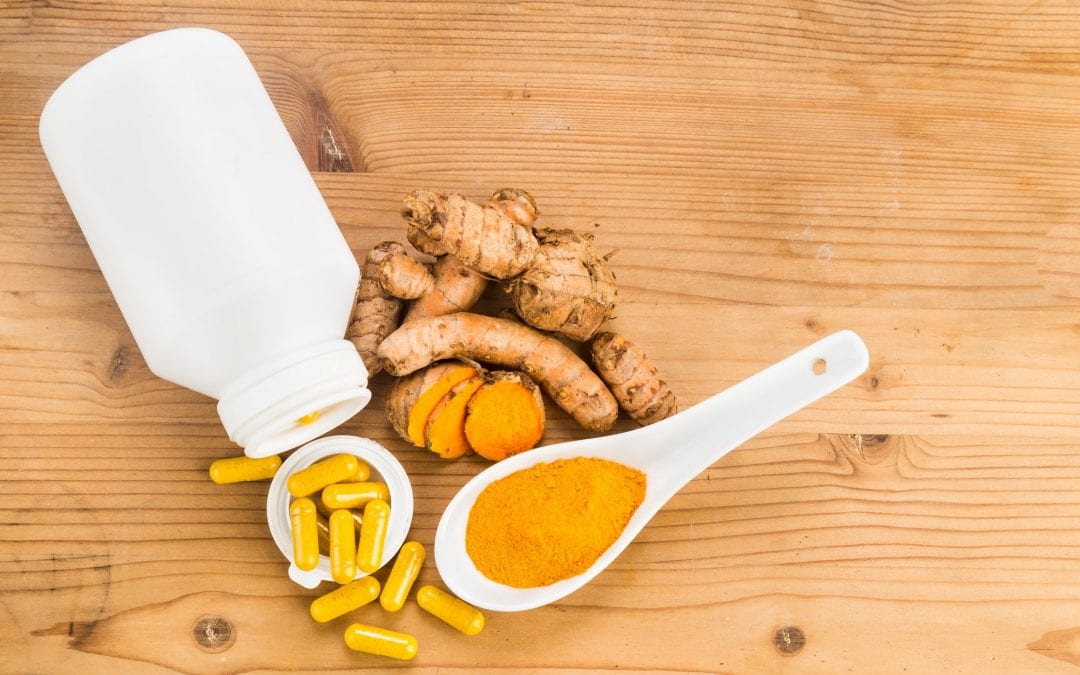Health benefits of turmeric
Turmeric is not a new health trend; in many Asian countries, people have been using turmeric as a flavorful spice and medicinal herb for centuries. It’s no surprise that turmeric has been the focus of many recent medical studies. The research is promising. The top benefits of turmeric include improvements for your heart, brain, joints, and gut. It can be a natural way to improve your quality of life.
Curcumin is the main chemical in turmeric. It is an anti-inflammatory and antioxidant. However, it is not usually enough to simply eat turmeric in food for treating health issues such as joint pain or brain function decline. That is why curcumin is often taken as a supplement.
Your body has a hard time absorbing curcumin, but thankfully the solution is simple: black pepper. Specifically, piperine (a component in black pepper) helps your body absorb curcumin. Many supplements also contain piperine so your body can get the full benefits of curcumin.

The Power Behind the Herb – The Health Benefits of Turmeric
Natural Anti-Inflammatory
Inflammation is not all bad. It is essential in fighting off diseases and foreign invaders in your body. However, too much inflammation or chronic inflammation can be damaging. It can be a factor in causing other chronic diseases, including heart disease, metabolic syndrome, cancer, Alzheimer’s disease and other degenerative conditions. [1] [2]
Thankfully, curcumin is a strong anti-inflammatory. It is even as effective as some drugs, and doesn’t have any of the side effects of those drugs. [3] [4] [5] So, how does it work? Curcumin blocks a molecule (called NF-kB) that travels into the nuclei of your cells and tells it to turn on genes related to inflammation. [6] [7]
Bottom line: Curcumin is a bioactive substance that fights inflammation at the molecular level. [8]
Powerful Antioxidant
Antioxidants help stabilize other harmful molecules in your body called free radicals. These are molecules that have lost an electron and cause other molecules to become free radicals. Antioxidants simply supply free radicals with the electron they have lost. Oxidative damage is a major factor in aging and other disease (for example, Alzheimer’s disease).
Curcumin is one of these helpful antioxidants, neutralizing free radicals. Not only does it help stabilize these molecules, but it also stimulates the body’s antioxidant defenses. [9] [10]
Health Benefits of Turmeric
Relieves Joint Pain and Arthritis
Curcumin is relieving joint pain by hindering the causes and treating the symptoms. It can even help in relieving arthritis. Arthritis is caused by inflammation in the joints. So, the Anti-inflammatory properties of curcumin help decrease the inflammation. [11] It is also known to improve symptoms and provide pain relief. [12]
Some research shows that turmeric extracts can relieve pain and improve knee function in people with knee osteoarthritis (arthritis caused by a breakdown of cartilage). For some patients, it seemed to work as well as ibuprofen. However, it did not work as well as diclofenac for relieving pain. But it can be a promising natural supplement for your joint pain. [13]
Improves Heart Health

Curcumin is also a friend to your heart and can prevent causes of heart disease. For one, it lowers triglyceride levels. These are lipids found in your blood that, like free radicals, are harmful when there too much in the blood. High triglyceride levels are often a sign of other risk factors of heart disease; they also contribute to hardening the artery walls. Curcumin works to lower triglyceride levels and lower your risk of heart disease.
It also has another super weapon: it improves the lining of the blood vessels (a function called endothelium). Being an anti-inflammatory and antioxidant, curcumin also protects your heart against harmful molecules and inflammation. [14]
Research also shows that curcumin can help people who are undergoing coronary artery bypass surgery. One study had a group take 4 grams of curcumin a day before and after the surgery. The group showed a 65% decreased risk of having a heart attack in the hospital. [15]
Can [Prevent] Certain Cancers
Cancer is uncontrolled cell growth. It is complex, so attempts to prevent and treat it have been hard to find. Surprisingly, one powerful weapon against cancer might be in your kitchen. Curcumin can kill various types of tumor cells and halt the growth of new blood vessels in tumors. Researchers say, “It’s ability to kill tumor cells and not normal cells makes curcumin an attractive candidate for drug development.” [16]
Curcumin is not a cure-all, but early research tells us that it can help prevent and treat various types of cancers. Studies have shown that certain products that have turmeric extract and Javanese turmeric extract can stabilize some [measures] of colon cancer. [13] Another study had prostate cancer patients take a formula of broccoli powder, turmeric powder, pomegranate powder, and green tea extract three times a day for six months. Results showed that this prevented an increase in prostate specific antigen levels. [13]
More research is needed to understand this process better and know if turmeric alone can be a method of prevention and treatment, but the early research is promising.
Treats Depression

Turmeric has become a natural, go-to antidepressant. Most research confirms that taking curcumin reduces depression symptoms. One controlled trial had 60 people split into three groups: one taking Prozac, one taking curcumin (1 gram / day), and a third taking both Prozac and curcumin. After 6 weeks, the results showed that curcumin was similar to Prozac and the group who took both had the best results.
The health benefits of turmeric can be a natural way to battle depression. If the depression is strong, it may not replace traditional treatments. Talk to your doctor if taking curcumin is the right path for you. [13] [17]
Counters Intestinal Inflammation
Because curcumin is a natural anti-inflammatory, it can help reduce intestinal inflammation. Early research suggests that a turmeric extract (taken daily for 8 weeks) reduces the frequency of IBS in patients who are otherwise healthy. [13]
Other diseases, including Crohn’s disease and ulcerative colitis, have also seen positive results from curcumin. Ulcerative colitis patients that took curcumin for six months saw a reduction of symptoms (this was used in combination of conventional treatment). [13] Other research showed that curcumin reduced bowel movements, diarrhea, and stomach pain in people with Crohn’s disease.
It has not been shown to be effective for stomach ulcers, but some research suggests that it may help an upset stomach. Though turmeric supplements should not replace traditional treatment, it can help alleviate intestinal pain and reduce inflammation.
Boosts Brain Health

Taking curcumin has been linked with improved brain function and a lower risk of brain diseases. It is important in the health of neurons (nerve cells that transmit nerve impulses in the nervous system and brain).
The brain is continually producing neurons and making new pathways. Brain-derived neurotrophic factor (BDNF) is a growth hormone in the brain and is important in the creation and connection of neurons. [18] Low levels of BDNF have been linked to brain diseases [19] [20]. Fortunately, curcumin can increase BDNF levels, which may be important in delaying or even treating brain diseases. [21] [22] [23]
Alzheimer’s disease (AD) is the most common neurodegenerative disease. There are not many treatments available, but curcumin may be able to help. In addition to being an antioxidant and anti-inflammatory, it is also able to reduce protein tangles called amyloid plaques. Buildups of these plaques are a known factor of Alzheimer’s disease, but curcumin’s ability to clear them could be key in preventing AD. [24]
However, other studies have not shown that curcumin improves mental function in people with Alzheimer’s disease. It may be that curcumin is better for preventing the disease that actually treating it. [13]
Reduces Itching
Are you itching to try curcumin already? Well, curcumin can actually help with itching, too.
Studies have shown that curcumin seems to reduce hay fever symptoms like sneezing, itching, a runny nose, and congestions. It has also been linked to reduce chronic itching in patients with long-term kidney disease. Skin rashes caused by lichen planus have been treated with an ointment containing curcumin. It has not been found to be effective in treating skin problems related to cancer treatments. [13]
The Bottom Line
The health benefits of Turmeric (and its key component curcumin) are beneficial in many areas. It’s natural, time-tested, and simple to take as a supplement. It can protect your brain from decline, your heart from heart disease, treat depression, and reduce inflammation in your gut. Always feel free to talk to your doctor about taking turmeric to see if it is right for you.
Turmeric should not be taken by people who:
- Are pregnant or breastfeeding
- Have gallbladder problems
- Suffer from chronic bleeding problems
- Have diabetes
- Experience gastroesophageal reflux disease (GERD)
- Have hormone-sensitive conditions such as breast cancer, uterine cancer, ovarian cancer or uterine fibroids
- Are experiencing infertility
- Have an iron deficiency
- Are going into surgery (extra bleeding during or after surgery)
Resources:
- https://www.ncbi.nlm.nih.gov/pubmed/12490959
- https://www.ncbi.nlm.nih.gov/pubmed/21633179
- https://www.ncbi.nlm.nih.gov/pubmed/19594223
- https://www.ncbi.nlm.nih.gov/pubmed/10404539
- https://www.ncbi.nlm.nih.gov/pubmed/15489888
- http://www.jbc.org/content/270/42/24995.full
- https://www.ncbi.nlm.nih.gov/pubmed/17885582
- https://www.ncbi.nlm.nih.gov/pubmed/12676044
- https://www.ncbi.nlm.nih.gov/pubmed/17569207
- https://www.ncbi.nlm.nih.gov/pubmed/10964379
- https://www.ncbi.nlm.nih.gov/pubmed/22407780 .
- https://www.ncbi.nlm.nih.gov/pubmed/20657536
- https://www.webmd.com/vitamins/ai/ingredientmono-662/turmeric
- https://www.ncbi.nlm.nih.gov/pubmed/19233493
- https://www.ncbi.nlm.nih.gov/pubmed/22481014
- https://www.ncbi.nlm.nih.gov/pmc/articles/PMC2758121/
- https://www.ncbi.nlm.nih.gov/pubmed/23832433
- https://www.ncbi.nlm.nih.gov/pmc/articles/PMC2504526/
- https://www.sciencedirect.com/science/article/pii/S0006322303001811
- https://www.sciencedirect.com/science/article/abs/pii/0896627391902733
- https://www.sciencedirect.com/science/article/pii/S0006899306027144
- https://www.sciencedirect.com/science/article/pii/S0166432812006997
- https://www.ncbi.nlm.nih.gov/pmc/articles/PMC3281036/
- https://www.ncbi.nlm.nih.gov/pubmed/16988474

